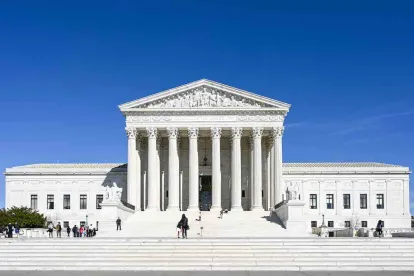Continuing the issuance of opinions as to which the Justices are largely of one mind, the Court today handed down three decisions. Each gives important guidance to litigators on both sides of the ball. The first of these is a unanimous opinion settling the hotly debated question of whether intent under the federal False Claims Act (FCA) is a subjective or objective matter. It is the former. The second decision, also unanimous, clarified what a plaintiff must plead and prove to establish securities fraud regarding a stock offering through a direct listing. The third case offers a lone dissent over a majority and concurring opinions rejecting a labor union’s argument that the National Labor Relations Act (NLRA) preempts a state court tort action concerning workers sabotaging a company’s concrete trucks.
The FCA case is United States ex rel. Schutte v. Supervalu Inc., and it resolves the issue as to whether the FCA’s scienter element refers to a defendant’s subjective belief as to the falsity of a claim, not what an objectively reasonable person might believe. While many commentators had thought that a conservative majority of the Court might have opted for the objective test, the result was the opposite, as the Court handed a significant win for the government and for qui tam relators acting on its behalf.
The case itself involved claims that two retail pharmacies had violated the FCA, 31 U. S. C. §§3729 et seq., by seeking reimbursement at its alleged “usual and customary” rates when, in fact, it offered customers discounted prices that were substantially lower than what the pharmacies were billing the government. “In sum, petitioners claim that the evidence shows that respondents thought their claims were inaccurate yet submitted them anyway.” The two essential elements of an FCA claim are, first, that the claim is false, and second, that the defendant knew that the claim was false. The first element was not in issue. And, in an opinion written by Justice Thomas, the Court unanimously held that the FCA’s scienter element refers to what a defendant knew and subjectively believed, not what a reasonable person might have had reason objectively to believe. The decision represents a strict textual approach guided by the traditional meaning of scienter at common law. Terms like “actual knowledge,” “deliberate ignorance,” and “recklessness” accurately describe the fraudulent intent of persons who might actually have been aware of falsity or, conscious of the risk they bear, offer post- hoc justifications to mask the falsity of a claim. The Court also rejected the respondents’ arguments concerning common law fraud not encompassing misrepresentations of law, holding that whatever the legal basis of the suit against them might be, their misrepresentation of their usual and reasonable price was a matter of fact.
As someone who often represents defendants in FCA cases, and who once led the Justice Department in prosecuting such cases, I’ll simply note that this decision definitively changes the lay of the land in rejecting an objectively based safe harbor or defense. The sole issue in assessing scienter is what a defendant subjectively knew or believed at the time it filed a reimbursement claim with the government, not how the matter might be rationalized after the fact.
Slack Technologies, LLC v. Pirani arose from a direct listing public offering of securities by the well-known messaging app company “Slack.” The Securities Act of 1993, 15 U. S. C. §§77, imposes strict liability on issuers when their registrations contain material misstatements or fail to disclose them. Under the direct listing process, persons who hold previously unregistered company shares are free immediately to sell their shares to the public. When the company went public, Mr. Pirani bought 250,000 such shares, and, as often happens, the market price dropped substantially. Mr. Pirani then sued, claiming that the company had filed a misleading registration document. Section 11(a) of the 1933 Act requires a person claiming fraud to prove that he or she has acquired “such security” pursuant to a misleading registration statement. The case turned upon what the term “such security” means, i.e., whether it refers not only to securities registered under a defective registration statement but also to other shares that are traceable to it, as Mr. Pirani argued. Looking to the context of the circumstances in determining the meaning of the statute, Justice Gorsuch, writing for a unanimous Court, held that when it refers to “such security,” the law speaks to a security registered under the particular registration statement alleged to contain a falsehood or misleading omission. Indeed, a section of the statute indicates that a registration statement is “effective” for “only . . . the securities specified therein.” Collectively, the contextual clues persuaded the Court that Slack’s reading of the law is better than Mr. Pirani’s contention that the Court should read the phrase “such security” to include not only securities registered under a defective registration statement but also other securities that bear some sort of minimal relationship to a defective registration statement.
Management-side attorneys will be pleased with the Court’s holding in Glacier Northwest, Inc. v. International Brotherhood of Teamsters. Justice Barrett delivered the opinion of the Court, in which the Chief Justice and Justices Sotomayor, Kagan, and Kavanaugh joined. Justices Thomas, Gorsuch, and Alito concurred. As against this jurisprudentially diverse array, Justice Jackson was the only dissenter. The case concerned the issue of whether the NLRA preempted a state tort claim that union members, by their inaction in delivering concrete contained in company trucks, intentionally destroyed property owned by Glacier. Preemption by a federal law generally occurs when it actually conflicts with state law. However, while a federal law generally preempts state law when the two actually conflict, the NLRA preempts state law even when the two only arguably conflict. San Diego Building Trades Council v. Garmon, 359 U. S. 236, 245 (1959). Thus, the Union argued that the NLRA—which protects employees’ rights “to self-organization, to form, join, or assist labor organizations, . . . and to engage in other concerted activities for the purpose of collective bargaining or other mutual aid or protection,” arguably protected the drivers’ conduct, thus depriving the state of the power to hold the Union accountable for its members’ conduct during a strike. The Court soundly rejected the Union’s defense. While the NLRA might protect the right to strike, that right is not absolute. By initiating a midday strike and doing nothing to protect the company’s trucks from damage and loss occasioned by hardening concrete, the Union intentionally coordinated with its drivers to destroy company property, and such conduct is not protected by the NLRA. In dissent, Justice Jackson would read the Garmon case broadly to protect the Union’s conduct. Both the majority and concurring opinions made it clear that Garmon is something of an aberration that should be applied narrowly. The decision of the Washington State Supreme Court was therefore reversed, and the case was remanded for further action in light of the Supreme Court’s holding.




 />i
/>i

